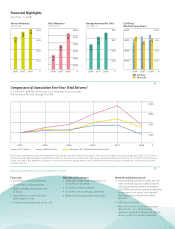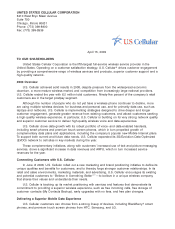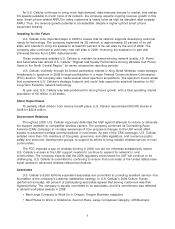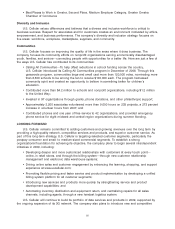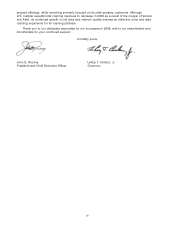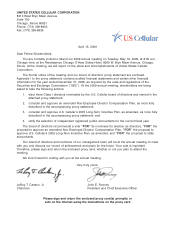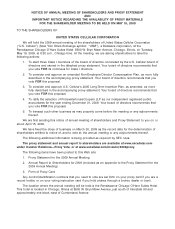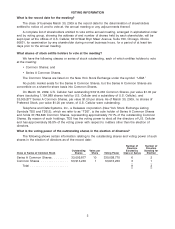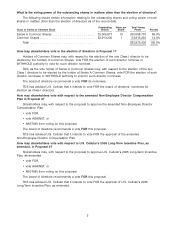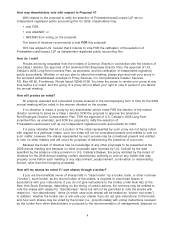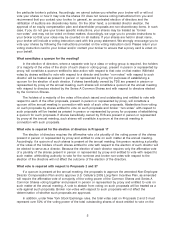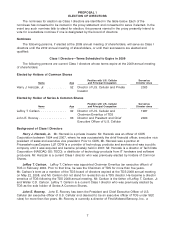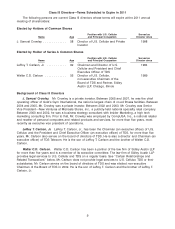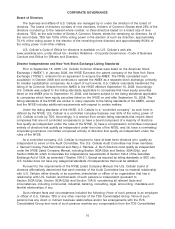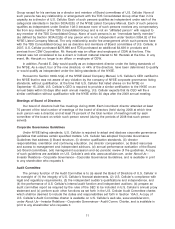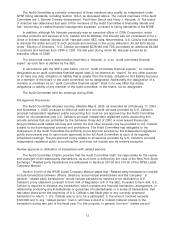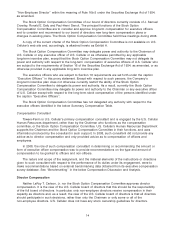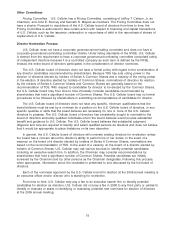US Cellular 2008 Annual Report Download - page 12
Download and view the complete annual report
Please find page 12 of the 2008 US Cellular annual report below. You can navigate through the pages in the report by either clicking on the pages listed below, or by using the keyword search tool below to find specific information within the annual report.the particular broker’s policies. Accordingly, we cannot advise you whether your broker will or will not
vote your shares or how it may vote the shares if it does not receive voting instructions from you and
recommend that you contact your broker. In general, an uncontested election of directors and the
ratification of auditors are discretionary items. On the other hand, a contested director election, the
approval of an equity compensation plan and shareholder proposals are non-discretionary items. In such
case, if you do not give your broker specific instructions, your shares may be treated as ‘‘broker
non-votes’’ and may not be voted on these matters. Accordingly, we urge you to provide instructions to
your broker so that your votes may be counted on all matters. If your shares are held in street name,
your broker will include a voting instruction card with this proxy statement. We strongly encourage you to
vote your shares by following the instructions provided on the voting instruction card. Please return your
voting instruction card to your broker and/or contact your broker to ensure that a proxy card is voted on
your behalf.
What constitutes a quorum for the meeting?
In the election of directors, where a separate vote by a class or voting group is required, the holders
of a majority of the votes of the stock of such class or voting group, present in person or represented by
proxy, will constitute a quorum entitled to take action with respect to that vote on that matter. Withheld
votes by shares entitled to vote with respect to a director and broker ‘‘non-votes’’ with respect to such
director will be treated as present in person or represented by proxy for purposes of establishing a
quorum for the election of such director. If shares beneficially owned by TDS are present in person or
represented by proxy at the annual meeting, such shares will constitute a quorum at the annual meeting
with respect to directors elected by the Series A Common Shares and with respect to directors elected
by the Common Shares.
The holders of a majority of the votes of the stock issued and outstanding and entitled to vote with
respect to each of the other proposals, present in person or represented by proxy, will constitute a
quorum at the annual meeting in connection with each of such other proposals. Abstentions from voting
on such proposals by shares entitled to vote on such proposals and broker ‘‘non-votes’’ with respect to
such proposals will be treated as present in person or represented by proxy for purposes of establishing
a quorum for such proposals. If shares beneficially owned by TDS are present in person or represented
by proxy at the annual meeting, such shares will constitute a quorum at the annual meeting in
connection with such proposals.
What vote is required for the election of directors in Proposal 1?
The election of directors requires the affirmative vote of a plurality of the voting power of the shares
present in person or represented by proxy and entitled to vote on such matter at the annual meeting.
Accordingly, if a quorum of such shares is present at the annual meeting, the person receiving a plurality
of the votes of the holders of such shares entitled to vote with respect to the election of such director will
be elected to serve as a director. Because the election of each director requires only the affirmative vote
of a plurality of the shares present in person or represented by proxy and entitled to vote with respect to
such matter, withholding authority to vote for the nominee and broker non-votes with respect to the
election of the directors will not affect the outcome of the election of the directors.
What vote is required with respect to Proposals 2 and 3?
If a quorum is present at the annual meeting, the proposals to approve the amended Non-Employee
Director Compensation Plan and to approve U.S. Cellular’s 2005 Long-Term Incentive Plan, as amended
will require the affirmative vote of a majority of the voting power of the Common Shares and Series A
Common Shares voting together and present in person or represented by proxy and entitled to vote on
such matter at the annual meeting. A vote to abstain from voting on such proposals will be treated as a
vote against such proposals. Broker non-votes with respect to such proposals will not affect the
determination of whether such proposals are approved.
In addition, under New York Stock Exchange rules, the total votes cast on Proposals 2 and 3 must
represent over 50% of the voting power of the total outstanding shares of stock entitled to vote on the
5


